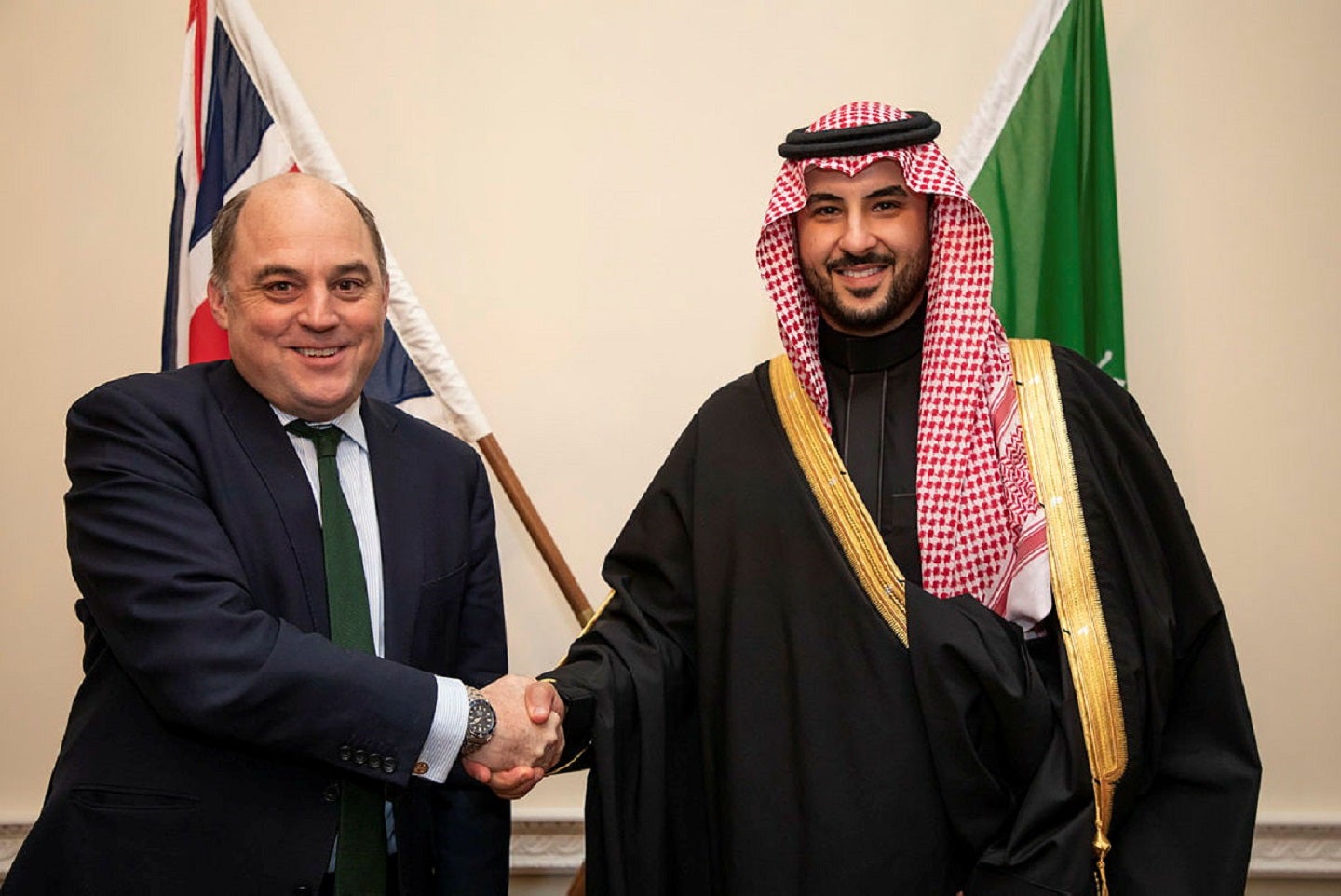
The UK Minister for Defence Ben Wallace has been busy cultivating a string of agreements with countries to incentivise greater global industrial collaboration. The latest agreement with Saudi Arabia concluded this week, lasting between 28 February and 2 March.
The two countries have signed a statement of intent (SoI) to explore the possibilities available to build on their existing and long-standing combat air relationship for the future.
This SoI comes soon after the UK Ministry of Defence (MoD) agreed to expand its joint efforts with Italy in space and cyber domains. This goes beyond existing industrial collaboration on the Global Combat Air Programme (GCAP) to construct a sixth-generation fighter jet, confirmed earlier this month on 9 February.
Meanwhile, the Anglo-Saudi SoI follows the signing of the Plan for Defence Cooperation (PDC) in London on 13 December 2022. The MoD has stated that this plan to cooperate with Saudi Arabia “will enhance bilateral defence and security cooperation to address shared security challenges, including through regular dialogue and consultation, education and training, and capability-building”.
The plan is intended to reaffirm the UK’s enduring commitment to working with the Kingdom of Saudi Arabia on promoting regional security and stability.
This places the more recent SoI as part of this new dialogue process, and more specifically aims to bolster industrial cooperation in the defence industry.
Moreover, the SoI indicates a possible future joint aerospace programme similar to the GCAP.
Wallace stated: “The Statement of Intent… will strengthen our Saudi-UK combat air relationship and our ability to address shared security challenges for decades to come, supporting Saudi Vision 2030 aspirations.”
The Saudi Vision for 2030 is a strategic framework formed in 2016 that aims to reduce Saudi Arabia’s dependence on oil, diversify its economy and trade, and develop public service sectors. Part of the vision is to localise its own defence industries with the goal of localising over 50% of military equipment spending by 2030.
According to GlobalData the Saudi 2023 defence budget is nearly $52bn, of which the Saudi Vision states only 2% of this spending is within its Kingdom.
In looking to secure and temper shared security challenges, as well as to “support regional stability and security” in the Gulf, a potential industrial collaboration on an aerospace project will be fruitful to all interests.
Gaining non-traditional partners
However, there is one UK interest this SoI does not satisfy.
While the MoD emphasises their long-standing ties with Saudi Arabia, which are over fifty years old, this partnership does not align with the MoD’s desire to gain non-traditional industry partners. This objective has been in place since 2019.
The MoD has stated clearly that it wants “to encourage innovation in our business and attract new and non-traditional suppliers in all levels of the defence supply chain. Our military customers have put innovation high on their agenda and we expect this to be reflected in their future requirements”.
This objective to source new and untapped supply chains in the defence industry is predominantly underpinned by advances in technology and technical skills.
Saudi Arabia is a reasonable choice for collaboration in this area. GlobalData’s Macroeconomic Outlook Report on Saudi Arabia points to the country’s technology use.
It is detailed that the Kingdom’s performance in terms of patents was better than most other Gulf countries in 2021, as they were granted 34.6 patents per million population, followed by Israel (12.5) and Egypt (0.9) in 2021.
Although, Saudi Arabia’s high-technology exports, as a percentage of total manufactured exports was very low (0.6%), compared to the UAE (5.2%) and Israel (28.2%). The high volume of crude oil exports has discouraged the growth of technology intensive industries in Saudi Arabia.
Tech-driven defence
Alternative supply chains within a technologically driven defence industry are best met in partnering with certain European companies. For example, the UAE has caught on to this, having bought a majority stake in Tallinn-based company Milrem Robotics.
Similarly, Australia’s Guided Weapon and Explosive Ordnance enterprise has hit the ground running with an ever expanding defence industrial base. The country has seen its first internally produced UAS, the Strix, showcased at Avalon 2023.
Part of the SoI agreement will be to conduct a Partnering Feasibility Study (PFS) to find out what areas of collaboration could be worth pursuing in the air combat industry.
But what is generally understood is that the Kingdom of Saudi Arabia is, for now, a sensible industry partner for its oil resources. But in terms of seeking fertile ground for alternative supply chains in a technologically driven defence industry, the UK is not likely to find what it seeks here.




